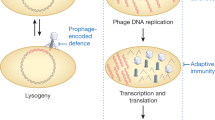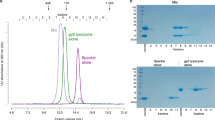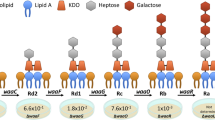Abstract
IT has been the general experience of phage investigators1 that bacterial viruses reach their highest titres when preying on rapidly growing cultures, differing thereby from the large group of plant and animal viruses, which are able to multiply in host cells regardless of stage of development. Krueger et al.2 showed that staphylococci will support phage reproduction in the presence of penicillin which inhibits their own growth; but such organisms must first be ‘activated’, which means they must have entered the logarithmic phase of growth.
This is a preview of subscription content, access via your institution
Access options
Subscribe to this journal
Receive 51 print issues and online access
$199.00 per year
only $3.90 per issue
Buy this article
- Purchase on Springer Link
- Instant access to full article PDF
Prices may be subject to local taxes which are calculated during checkout
Similar content being viewed by others
References
Adams, M. H., “Methods in Medical Research”, 2, 11 (1950).
Krueger, A. P., Cohn, T., Smith, P. N., and McGuire, C. D., J. Gen. Physiol., 31, 477 (1948).
Gratia, A., Ann. Inst. Pasteur, 57, 652 (1936).
Kerr, S. E., and Seraidarian, K., J. Biol. Chem., 159, 211 (1945).
Price, W. H., J. Gen. Physiol., 32, 301 (1948).
Cohen, S. S., Bact., Rev., 15, 131 (1951).
Author information
Authors and Affiliations
Rights and permissions
About this article
Cite this article
KOPPER, P., LONG, G. An Uncommon Type of Bacteriophage. Nature 169, 331–332 (1952). https://doi.org/10.1038/169331a0
Issue Date:
DOI: https://doi.org/10.1038/169331a0
Comments
By submitting a comment you agree to abide by our Terms and Community Guidelines. If you find something abusive or that does not comply with our terms or guidelines please flag it as inappropriate.



